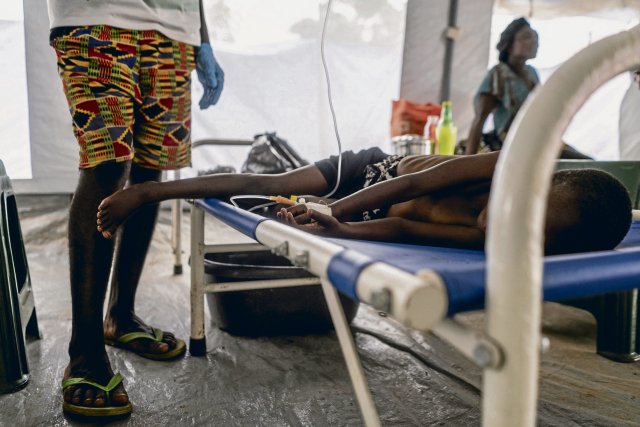Severe cholera cases, like this patient, are treated with electrolyte infusions at a health center in Malawi’s capital Lilongwe.
Photo: AFP/Fredrik Lerneryd
After a long time, there is another report regarding the fight against cholera that fuels cautious optimism: the first rapid test kits arrived in the southeast African country of Malawi a few days ago. “These will provide health workers with the critical and timely data they need to stop outbreaks early and guide efforts to better prevent and treat cholera,” said Michael Ryan, executive director for health emergencies at the World Health Organization (WHO), in addition.
The campaign in Malawi is the starting signal for a global procurement program: In total, more than 1.2 million cholera rapid tests are planned to be delivered to 14 affected countries “as part of the largest global campaign to date”. The project is financed by the Gavi vaccination alliance and is provided by the WHO and the UN Children’s Fund Unicef. Other partners are involved, such as the Find organization, which takes care of the quality of the diagnostic procedures.
The rapid tests are urgently needed because since the Corona crisis there have been almost only bad reports of the classic diseases of poverty in the global south, such as cholera. The acute intestinal infection, which has been known since the beginning of the 19th century, is transmitted through food and water that is contaminated with feces. The pathogen is the bacterium Vibrio cholerae, which produces the poison cholera toxin in the intestines of those affected. If left untreated, cholera can sometimes be fatal within a few hours. People die as a result of fluid loss.
The WHO had already declared the seventh cholera pandemic in 1961 after numerous outbreaks. This is still not over, and the numbers have even increased massively again since 2021. In 2022, 473,000 cases were reported to WHO. Preliminary data for 2023 suggests a further increase to over 700,000 reported cases. The number of unreported cases is high: according to estimates, there are currently three to five million cases of cholera per year worldwide, of which up to 140,000 are fatal. A total of 30 countries have reported outbreaks since 2021, and there are currently 16. Aid organizations are observing with particular concern that it is also affecting countries that were considered cholera-free for decades and that the severity and mortality rates have also increased sharply – “despite simple, effective and affordable treatment options «, as the WHO writes in frustration.
Cholera primarily affects poor countries and the poorest parts of the population. There are currently outbreaks mostly in tropical and subtropical Africa, as well as in Syria and Haiti. A fatal accident in northern Mozambique shows how desperate the situation is in the affected areas: 91 people died on Sunday when an overcrowded fishing boat with which many people were trying to escape cholera from the mainland to an island sank.
One of the reasons for the sudden increase in many countries was the overload of the public health system and medical staff during the corona crisis, when a particularly large number of cases remained untreated. The actual cause is still inadequate access to clean water and sanitation facilities. The situation has recently worsened in many regions and countries following floods, some of which are caused by climate change, as well as wars, economic crises, conflicts and displacement.
Vaccinations are also supposed to help in the fight against cholera, but preventive campaigns are currently taking a back seat internationally to emergency operations. Although the supply of oral vaccines has increased eighteen-fold since 2013, the unprecedented demand cannot come close to being met, especially since one of the two manufacturers has left the market and the remaining one, Eubiologics from South Korea, is overwhelmed. “The background is that the market is not commercially attractive enough,” criticizes the organization Doctors Without Borders. Due to the shortage, only one dose is currently administered instead of two, but this offers shorter protection. Last year, around 36 million doses were produced, while, according to the WHO, 14 affected countries alone reported twice the need for a reactive one-dose strategy. The situation is only likely to improve somewhat when a new manufacturer enters the market, which is expected at the end of the year.
A few months ago, numerous aid organizations and UN institutions appealed “to vaccine manufacturers, governments, donors and partners to urgently ramp up the production of vaccines and invest in all necessary measures to prevent and combat cholera.” WHO Director Ryan says: “We urgently need action on all fronts, including countries’ commitment to clean water, sanitation and hygiene. It is a tragedy that cholera continues to afflict and kill people today.”
In the short term, however, it is about the provision of diagnostic procedures. The program now being launched will “improve the timely and accurate detection of cholera outbreaks and the response to them by increasing routine surveillance and testing capacity,” say those involved. However, we are still in pure emergency mode: There are only preliminary findings on the reliability of the tests used – the studies have not yet been completed.
Subscribe to the “nd”
Being left is complicated.
We keep track!
With our digital promotional subscription you can read all issues of »nd« digitally (nd.App or nd.Epaper) for little money at home or on the go.
Subscribe now!
